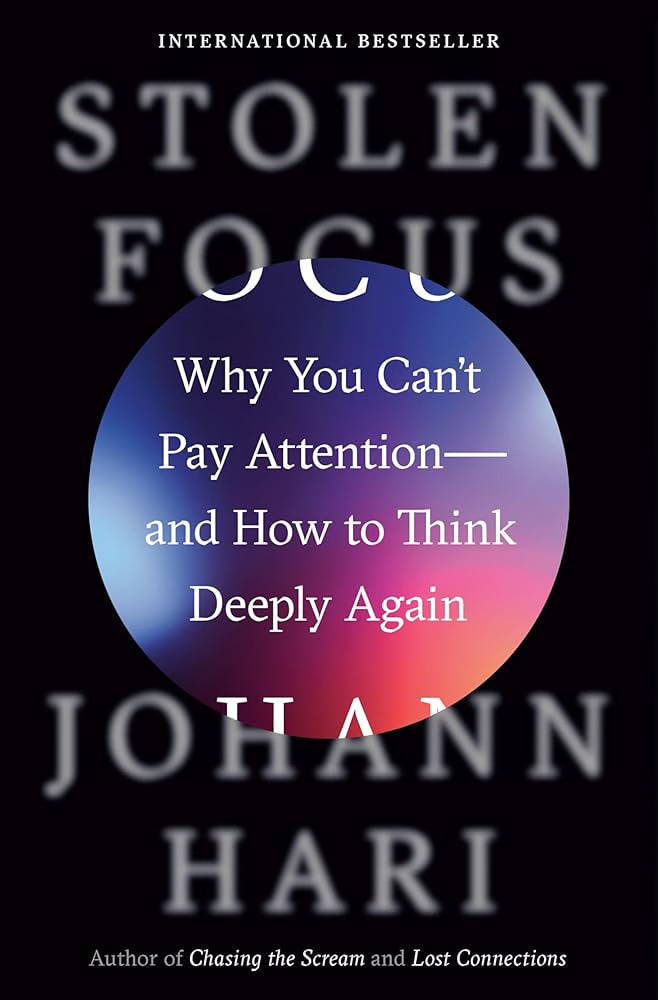I’ve read many books on the attention economy, ranging from Neil Postman’s classic Amusing Ourselves to Death, to Tim Wu’s deep dive into the history of media in The Attention Merchants. In such a saturated field, there is still a lot to like about this book. Hari is if anything thorough with both his diagnosis & prognosis of our collective societal & individual attention problems. The picture he paints here is pretty grim: our attention is under assault not only from the usual suspects (tech companies & their heavily engineered ad-revenue models), but from our diet, fragmented sleep, lack of childhood independence, and physiological stress brought about by the air of pessimism and doom that seems to permeate all of our media. Even Hari's pretty extreme solution of spending a summer entirely disconnected from his devices in Provincetown, MA didn't really work. He was back to his old ways within days of returning to civilization.

I'm in pretty strong agreement with Hari about individual solutions being ineffective at combating this problem. I have been aware for at least five years of the negative cognitive effects of screens, social media, and the modern entertainment-industrial complex in general. I got off both Facebook and Instagram in 2020, but for some reason, I keep being drawn back in (or to other sites like Substack & reddit). I know porn & information overload are also bad for me, but I continue to consume them, like a monkey drawn to a honeypot. And compared to the rest of generation, I am not really that bad: my screen time is usually under 2 hr/day every week. I don't bring my phone to work & I rarely multitask by consuming media. If neither myself, nor Hari, nor anyone else I have ever known can actually overcome this problem, what hope is there for the effectiveness of an individual solution?
What to do: Collective Action?
This is where Hari looks to collective action: on the national or international level. He draws inspiration from movements like women's suffrage, the fight for gay rights, and the campaign against CFCs. Perhaps I am cynical, but I find this level of optimism to be hopelessly naive for a number of reasons.
Firstly, those examples which I just listed were examples in which the forces of capital were neutral (CFCs, gay rights), or in fact in favor of the so-called revolution (women's suffrage). In this case, like that of the fight against climate change, or degrowth, capital is fundamentally against a system that would free our attention, as such a system would reduce profits.
Secondly, I'm not sure democratic change will actually work in this scenario. As we saw with prohibition & the failed war on drugs, people like their vices. I'm not sure my generation would be in favor of something like banning TikTok. Hari even states that his first week on Cape Cod was pretty difficult psychologically without the soothing mind-wipe of scrolling. Faith in democracy also misses the forces of capital arrayed against the interests of the common people who have so clearly been gaming our electoral system since the Civil War. If we can't stop Big Pharma from price gouging insulin, what makes the author think that we could upend the entire media ecosystem?
I think change fundamentally has to come from a level in-between the individual & the state (or global culture). I think many cultural critics miss the very existence of this level of culture, possibly because it has almost totally vanished from our world as an element of social change. I'm talking here about the family, the local community, and to some extent, the parishes/church. I'm not sure exactly how such a change could work, but I sure as hell do know that if I announce a goal to my roommates, fellow parishioners, or family, it is much more likely to actually be completed.
What to do: Personal Accountability
One last thing that Hari suggests doing is coming up with a list of six or so rules to help improve our your attention. My list of six is below.
1. Use a lock box for my phone/ the Cold Turkey App on my computer to precommit to periods of digital silence. Dedicate Sunday to a complete digital fast, in the spirit of the Sabbath.
2. Batch communication (emails/text/dating apps) to once or twice a day.
3. Food and technology don't mix. Not only will this keep my computer screen clean, but also will provide islands of silence throughout my day.
4. Spend some time reflecting pretty deeply about a piece of media after finishing it (like with this review).
5. Prioritize diet & sleep. Nothing goes well if these two don't
6. Personal degrowth (maybe more of a FIRE point, but still). Much of my use of the internet is driven by a materialistic hunger: more stuff, more hobbies, more information. I don't need all this shit: I know exactly what I need to do each day to feel happy and fulfilled in my daily life. Be content with what you have.
If you enjoyed this article, you can sign up for my mailing list here. I blog about language learning, biology, the science and art of learning, and many other things
Josh




